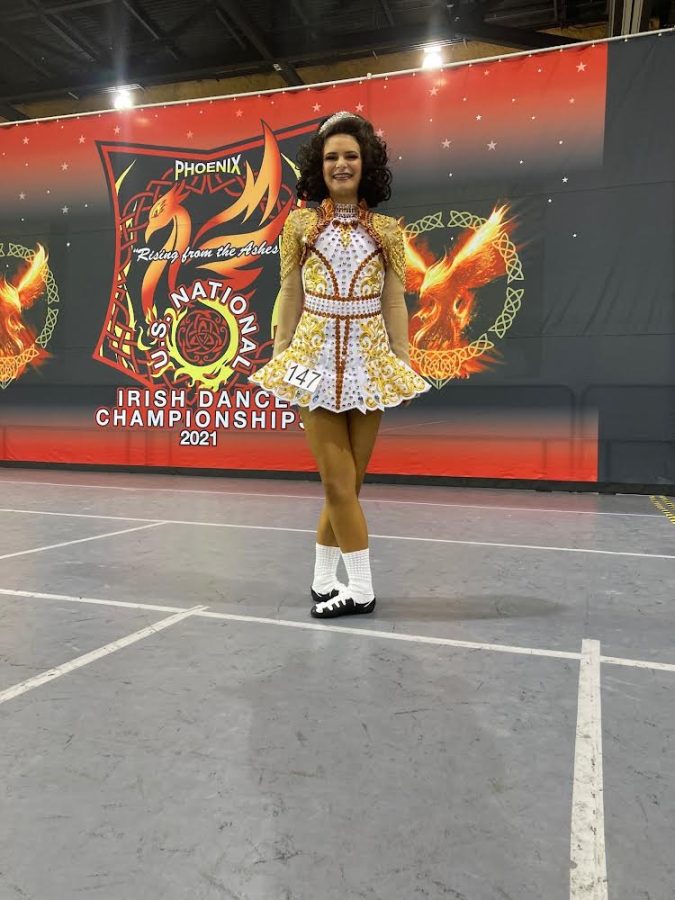Maisie Wragg’s Fascinating Passion
Freshman Maisie Wragg is at the Irish Dancing Championships, at Phoenix in 2021. She has been an Irish Dancer since she was little. “My two older sisters were dancing before I was even born, so I didn’t really have a say in the matter.”
February 12, 2022
Maisie Wragg has been Irish dancing for as long as she can remember knowing how to walk. The freshman says she was born into a family of Irish dancers.
“My two older sisters were dancing before I was even born, so I didn’t really have a say in the matter,” said Maisie.Maisie’s sisters Nora ‘20 and Gwyneth ‘23 are also Irish dancers and helped influence her interest in the hobby to round out the trio. The girls dance at Lavin Cassidy School of Irish in Worth, IL.
“My biggest motivators for improving my dancing and doing my best are my teachers,” Maisie said. “The ones that remind me that dancing is for fun, are my parents. They remind me why I dance, why I’ve been doing it for this long. They remind me to have fun.”
Not only was she born into this type of dancing, but she also has learned the meaning behind it as someone with Irish heritage. “The oldest thing I can remember is that during the oppression of the Irish, dancing was banned in an attempt to remove Irish culture,” she said. “It was primarily a boys dance, and “Traveling Dance Masters” would travel around Ireland, village to village, teaching people how to dance. They would wear bright clothes, and carried a staff. For those who did not know their right foot from their left, they would tie straw to ortcne foot, and hay to the other so they knew.”
Maisie’s hobby isn’t just a side project, though. She also has competed in 164 competitions with 13 of them being considered major Irish dance competitions. “I’ve won around 200 awards and accolades,” she said. But winning these wasn’t easy for her. The Lansing, IL native has had to practice for many hours–-often giving up entire weekends or weeknights to rehearsal
“The time I spend dancing differs all the time, and greatly. Depending on how close a major competition is or if we’re putting on a show soon, there might be extra practices for specific things. If nothing special is coming up or going on, one weeks practice time might add up to around 6 hours and 15 minutes (having practice three days a week). If a major competition is coming up, one week’s practice could be around 15 hours. I remember one time I counted 22 hours a week, right before a major competition,” said Maisie.
When COVID first hit, Maisie was unsure of her future with dance. However, like most other athletics that had to adapt, so did the Lavin Cassidy School of Irish dance. “At first, all practices were held on Zoom, and had to be done at home,” she said. “For me, since we don’t have space at home for a dance set up, we had to rearrange all the furniture in our living room and push everything as close to the walls as we could. Soon after, we were in the studio 1 day a week, and 2 days were virtual.”
Many of Maisie’s team competitions were canceled in the midst of the pandemic, like the World Championships. “Many places in the world didn’t have regionals, however here in Mid-America, we were lucky to be one of the few places that still had it. In the studio, we have to dance with a mask on the whole time, which has really tested our stamina” she said.
Maisie said that this sport has really helped her mature and teach her important life skills that many young people today might not experience. “Irish Dance has taught me patience, persistence, how to work hard. It’s taught me how to take constructive criticism well. To give everything you do your all, and how to accept your result,” she said. “If you try your hardest and don’t place well, you’re still successful. Because every competition, your biggest rival is yourself. You’re competing against the last time you danced, trying to be better every time. So if you’re satisfied with how you do, you’re a winner.”

